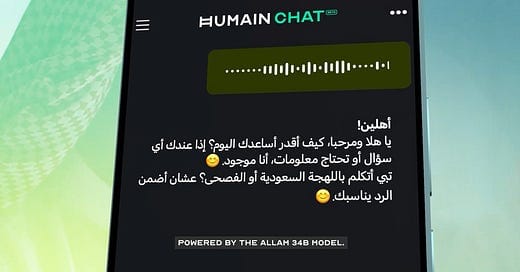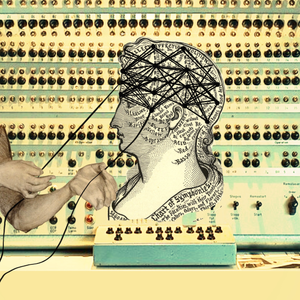Over the past few months, I’ve been drawn to stories of how different parts of the world are shaping their own AI tools – not just copying the global platforms but creating systems that speak in local languages, reflect cultural nuances, and express different values that matter to people on the ground.
In July, I wrote about experiments in Latin America with regionally tuned chatbots, and about The Vatican’s reminder that our engagement with AI must be rooted in human dignity and what it calls “the wisdom of the heart.”
Both, in different ways, point to a growing unease with the idea that generative AI should be a universal tool shaped in Silicon Valley – prioritising efficiency, scale and speed while overlooking or ignoring cultural identity and human dignity.
A New Milestone in Sovereign AI
Now, Saudi Arabia has stepped firmly into this space with the launch of HUMAIN Chat, a new bilingual Arabic–English chatbot described by its developer as a sovereign milestone: a chatbot created in Saudi Arabia for the Arabic-speaking world, and aligned with Islamic values.
The ambition is vast. HUMAIN Chat is designed for the 400 million Arabic speakers and two billion Muslims worldwide. The developer says it can handle multiple Arabic dialects, switch seamlessly between Arabic and English, and is hosted entirely in Saudi Arabia to meet that country's data protection laws.

The Arabic text shown in the screenshot translates into English as this:
Hello!
Hi and welcome. How can I help you today? If you have any questions or need information, I’m here. 😊
Do you prefer that I speak in Saudi dialect or in formal Arabic, so I can make sure my answer suits you? 😉
The team behind HUMAIN Chat emphasises that this isn’t just another model – it’s built on ALLaM 34B, described as the most advanced Arabic-first language model to date – but a claim to cultural and digital sovereignty.
There is an obvious attraction here. Many people, especially in the Global South, feel that tools like ChatGPT or Gemini, however powerful, often miss the cultural mark. They can translate words but not always meaning, or context.
HUMAIN Chat is presented as a remedy to that – a tool built from the start to reflect the heritage, values, and history of its users.
But there are challenges too. As The Times noted, the model is unlikely to approach issues like atheism or LGBTQ+ identity in the way Western platforms might, treating them instead through the lens of Saudi law and Islamic moral codes.
That’s a sharp reminder that AI, like all technologies, carries the imprint of the societies that design it.
The End of AI Universalism
What strikes me most, though, is the bigger picture. We are watching the end of AI universalism – the assumption that one or two global platforms will serve the world is breaking down. Latin America is building its own models. The Vatican is calling for an AI shaped by spiritual wisdom and human dignity. Now Saudi Arabia is asserting its cultural sovereignty in digital form.
For me, this isn’t just fragmentation – it could be enrichment. We may end up with a diverse ecosystem of AI tools that reflects the plurality of human society, not just the logic of a single valley in California. But there is also the risk of creating parallel AI worlds where cultural and political divides are reinforced, not bridged.
Either way, HUMAIN Chat is another sign that the future of AI won’t be written in only one language or framed by just one set of values. And that, I think, is something we should all be paying close attention to.




















